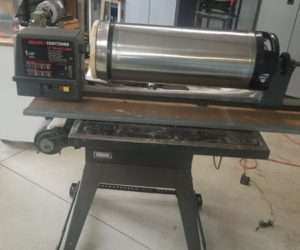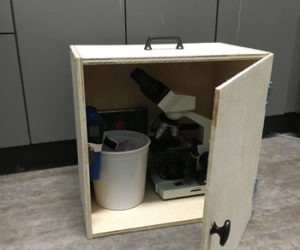The WashAll System: Not your everyday keg washer
I started brewing 5-gallon (19-L) batches about 15 years ago. One of the best things about a system that size is that cleaning it is for the most part pretty easy. Over the years I expanded my system to do 10-gallon (38-L) batches, switching to all-electric and upgrading to a heat exchange recirculating mash system (HERMS). I expected cleaning to be a bit more work than cleaning the 5-gallon (19-L) equipment, but the reality was the upgrade made the task much worse. Now I have expanded even more to 20-gallon (76-L) kettles and a 15-gallon (57-L) fermenter and, without a doubt, the cleaning effort and time has gone up exponentially rather than linearly!

I had seen numerous single-purpose corny keg cleaning projects, both homemade and commercial, and decided to build one that increased its capabilities exponentially as well — to help match my efforts. This design can clean large kettles, fermenters, corny kegs, picnic taps, hoses, pumps, chillers, buckets, and my HERMS coil just by changing a few “cleaning tools,” built with common ½-inch NPT landscape irrigation fittings including unions. The unions make tool change out quick and easy.
You should be able to build one for less than $200 and after that it’s like having an extra unpaid helper on brew day!
In use, I save all my used chiller water in the muck bucket, other plastic buckets, and my hot liquor tank (HLT). I start by removing as much of the spent mash as possible from my mash tun by hand. I find a large square recycled plastic food container works the best since it gets into the corners and also works well on the flat false bottom. Then I wash the mash tun on the WashAll with no sprayball connected, just the open plastic riser. If you use the sprayball right away it will get plugged with small pieces of mash that you missed. I do the same with the boil kettle. Once they are partly cleaned I pump the muck bucket out and clean it to get rid of all those particles of mash and boil kettle hops and break. I refill the bucket with fresh hot cleaning solution and run with the sprayball attached. The pump is connected to an inexpensive wireless remote control switch for AC power to make turning on/off quick and easy.
You can clean carboys and flasks with just the open PVC riser, with no sprayball attached, since it’s too large to fit through the opening. But care is needed for this task since carboys will also fill faster than they drain. You will need to cycle the pump on and off. You can also place smaller items on the hardware cloth while a pot is getting cleaned. It’s also an ideal time to clean, and dry by hand, the exterior of any equipment such as kettles, fermenters or corny kegs while they are upside down on the washer.
After everything is clean, all the WashAll parts fit into the muck bucket and it’s stored away. You should be able to build one for less than $200 and after that it’s like having an extra unpaid helper on brew day!



